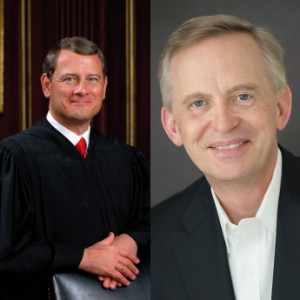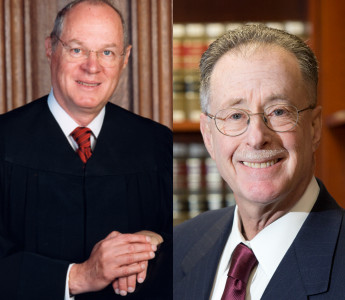McDonnell v. United States, 579 U.S. ___ (2016) (Roberts, C.J.).
Response by Professor Randall D. Eliason
Geo. Wash. L. Rev. On the Docket (Oct. Term 2015)
Slip Opinion | New York Times | SCOTUSblog
A Cramped Vision of Public Corruption
Suppose I’m a state governor approached by a businessman seeking to meet with a member of my administration to argue for a particular policy. I respond, “If you want me to arrange a meeting where you can make your pitch, my fee is $10,000. That fee won’t be disclosed to anyone, it just goes into my pocket. I’m not agreeing to influence any decision; I’ll just get you in the room with the right person. But if you don’t pay, no meeting.”
Sounds corrupt, doesn’t it? Access can be critically important. Anyone involved in business knows the value of “getting the meeting.” But after the Supreme Court’s ruling in McDonnell v. United States,1 this “pay for access” scheme would not be a bribe. This unfortunate decision dramatically limits the reach of federal bribery law. It was a win for McDonnell, but a loss for anyone concerned about public corruption and the influence of money in politics.
Former Virginia Governor Bob McDonnell and his wife Maureen were convicted on multiple counts of corruption in September 2014. The evidence at trial established that a businessman named Jonnie Williams showered the McDonnells with more than $170,000 in secret gifts and loans. In exchange, the government charged, McDonnell agreed to promote Williams’s dietary supplement Anatabloc within the Virginia government. McDonnell sent some emails and arranged meetings for Williams with various government officials to discuss possible research studies of Anatabloc, and hosted a product launch event for Williams at the Governor’s mansion.
The McDonnells were ultimately convicted of two corruption offenses, Hobbs Act extortion under color of official right2 and honest services wire fraud.3 Both of these statutes prohibit bribery, although neither defines that term. The Supreme Court agreed with the parties that bribery under these statutes should be defined by looking to the language of the principal federal bribery statute, 18 U.S.C. § 201 (2012).4 Section 201 defines bribery, in part, as a public official corruptly accepting a thing of value in exchange for agreeing to be “influenced in the performance of any official act.”5 “Official act” is defined as “any decision or action on any question, matter, cause, suit, proceeding or controversy, which may at any time be pending, or which may by law be brought before” that public official.6
McDonnell’s principal argument was that the things he did for Williams were not “official acts” but simply routine political courtesies he might extend to any supporter or constituent. He argued that while he may have made some calls or introduced Williams to government decisionmakers, he never tried to put his “thumb on the scale” of any decision those officials made. The critical distinction, the defense claimed, was between providing mere access and actually exercising official power.
In a unanimous opinion by Chief Justice Roberts, the Supreme Court agreed. The heart of the opinion is a detailed textual analysis of the language of § 201 quoted above. Deciding whether McDonnell performed “official acts,” the Court said, requires answering two questions: was there a “question, matter, cause, suit, proceeding, or controversy” within the meaning of the statute, and if so, did McDonnell take any “decision or action on” that proceeding or controversy.7
The Court first held that the terms “question, matter, cause, suit, proceeding or controversy” connote some kind of formal and structured exercise of government power, such as a lawsuit, determination by an agency, or hearing before a committee. The language suggests a specific and focused proceeding where something concrete is to be resolved; “the kind of thing that can be put on an agenda, tracked for progress, and then checked off as complete.”8 Simply arranging a meeting or making a phone call, the Court said, does not rise to this level.
Nor can making a phone call or arranging a meeting be considered a “decision or action on” a proceeding or controversy, the Court concluded. This language suggests the official is doing something to resolve the matter, not merely taking preliminary steps or making inquiries. If the official exerted pressure on someone else to act, that could qualify, but simply “setting up a meeting, talking to another official, or organizing an event (or agreeing to do so)”9 will not, standing alone, amount to official action.
The Court rejected the government’s argument for a broader interpretation of “official act” that would encompass a wider range of activities routinely carried out by public officials. This broader reading, the Court held, would “raise significant constitutional concerns” due to the potential to criminalize commonplace interactions between politicians and supporters.10 The Court noted that our system of government assumes public officials will hear from constituents and act on their concerns by making inquiries or asking staff to look into a problem. If routine constituent services could be considered official acts, the Court said, then a “pall of potential prosecution” would hang over such interactions if the constituent had ever provided the official with any support.11
The case now goes back to the Fourth Circuit to consider whether the evidence was sufficient to convict McDonnell under the Supreme Court’s new standard. If it was, he is entitled to a new trial with a properly instructed jury; if not, the case will be dismissed. Even if the Fourth Circuit rules that the evidence was sufficient, the government must decide whether it will choose to try him again.
The McDonnell opinion represents a real setback in the prosecution of public corruption. Lost in the Court’s detailed parsing of the statutory language is the larger bribery picture. Bribery involves a corrupt quid pro quo, or “this for that”—a public official agrees to exercise the power of his or her office in exchange for something of value. The flaw in the Court’s analysis is its exclusive focus on the quo side of the bribery transaction—what the public official agrees to do.
The essence of public corruption is an official selling the power of his or her office in exchange for an improper benefit. The corrupt public official acts not for the good of all, as she is sworn to do, but to benefit the person who is paying her off. The key is not so much what an official agrees to do, but why she agrees to do it. That determination cannot be made by examining the official’s actions in isolation; it requires examining the entire corrupt agreement.
In support of its narrow definition of “official act,” the Court observed: “conscientious public officials arrange meetings for constituents, contact other officials on their behalf, and include them in events all the time.”12 This is true, but it’s beside the point. Conscientious members of Congress vote on legislation all the time, but that doesn’t mean it’s permissible to agree to cast a vote in exchange for a bribe. And although politicians may routinely make phone calls or arrange meetings on behalf of their constituents, they don’t routinely do it in exchange for $175,000 in secret personal gifts, as McDonnell did.
Analyzing a potential bribery case involves examining the entire transaction; not just the quo, but the quid and the pro as well. The Court did note in passing that the behavior of McDonnell and Williams did not “typify normal political interaction between public officials and their constituents”—but that’s precisely the point.13 This case did not involve campaign contributions or other routine political support. The nature of the gifts themselves was substantial evidence of a corrupt agreement. A potential case involving legal campaign contributions and routine constituent services would be on a completely different footing.
In the world of public corruption, not all quid are created equal. But the Court’s analysis essentially treats the quid side of the equation as irrelevant: no matter how extreme and corrupt the gift, it doesn’t matter if what the official does in return does not fit the Court’s restricted conception of an “official act.”
In any potential corruption case it’s not enough for the government to prove a mere coincidence of timing, with an official acting in a way favored by a campaign contributor. The government must show a direct link between gift and action, and that the link was corrupt. Routine political support and constituent services are almost never going to meet that standard. That’s why such cases are not brought and why such interactions were not seriously called into question by McDonnell’s conviction. The Court’s analysis rests on the back of a straw man created by McDonnell and his allies.
By focusing exclusively on the particular trees of McDonnell’s actions rather than the entire quid pro quo agreement, the Court missed the corrupt forest that was the relationship between McDonnell and Williams. As a result, those with the means to make substantial personal gifts to a politician may now legally obtain access to the corridors of power that is unavailable to everyday citizens.
Access to government and to our elected officials should be available equally to all. Unfortunately, politicians are now free to sell that access to the highest bidder. And to prohibit this, according to the Supreme Court, would be to imperil the “basic compact underlying representative government.”14 This is a cramped conception of public corruption—not to mention a depressing vision of our democracy.
In addition to being a Professorial Lecturer in Law at The George Washington Law School, Randall D. Eliason specialized in white collar crime for over eight years as a member of the Public Corruption/Government Fraud section of the Office of the United States Attorney for the District of Columbia. From 1999 to 2001, he served as chief of that section and supervised a staff of eleven AUSA’s prosecuting white collar cases in federal court. Mr. Eliason is the recipient of numerous awards and commendations from the U.S. Department of Justice, Federal Bureau of Investigation, Washington D.C. Metropolitan Police Department, and other law enforcement agencies.
Randall D. Eliason is also a frequent media commentator on issues related to corporate and white collar crime and has appeared on PBS’s Frontline, NBC’s Nightly News, NPR’s Morning Edition, CNN, MSNBC, and elsewhere. His writings on federal criminal law have been published in law reviews, legal periodicals, and newspapers including The Washington Post and the Chicago Tribune. He writes about white collar crime and federal criminal law at Sidebars Blog, where he has previously discussed McDonnell v. United States.
- McDonnell v. United States, No. 15-474, slip op. (June 27, 2016).
- 18 U.S.C. § 1951 (2012).
- 18 U.S.C. §§ 1343, 1346 (2012).
- Section 201 generally applies to only federal public officials and so was not used in the prosecution of McDonnell, a state governor. Although both sides in McDonnell agreed that the bribery definition in 18 U.S.C. § 201 should control in his case, it’s not at all clear that this is correct. See R. Eliason, Bob McDonnell’s New Trial Motion and the Definition of ‘Official Act,’ SideBars (Nov. 19, 2014), https://rdeliason.com/2014/11/19/bob-mcdonnells-new-trial-motion-and-the-definition-of-official-act/. In light of the outcome of McDonnell’s case, the government may now regret conceding that the narrow definition of “official act” in § 201 defines bribery for purposes of all federal criminal laws.
- 18 U.S.C. § 201(b)(2)(A) (2012).
- 18 U.S.C. § 201(a)(3) (2012).
- McDonnell v. United States, No. 15-474, slip op. at 14 (June 27, 2016).
- Id. at 17.
- Id. at 21.
- Id. at 22.
- Id.
- Id.
- Id. at 23.
- Id.
Recommended Citation:
Randall Eliason, Response, McDonnell v. United States: A Cramped Vision of Public Corruption, Geo. Wash. L. Rev. On the Docket (July 4, 2016), http://www.gwlr.org/mcdonnell-v-united-states-a-cramped-vision-of-public-corruption/.





